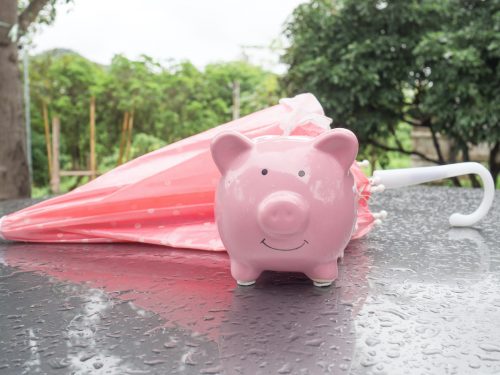
Should I Keep Investing When the Market Is Down?—Yes!
Investing can be a fantastic way to grow your long-term wealth. In fact, even when the market is down and volatile, it’s possible to navigate this uncertain terrain with greater security. Confidence in your understanding of how different types of investment vehicles interact is key.
In this article, we explore concrete reasons to consider making investments when stocks dip below average levels. We’ll also take a look at steps you can take to help keep your portfolio on track during a bull market.
This article discusses these topics:
- Why invest when the market is down?
- Keep your portfolio on track during volatility
- How to identify potentially good investments
- Buy low, minimize your withdrawals, & plan
Why Invest When the Market Is Down?
Have you ever envied someone who holds a ton of stock in a company that you wish you could afford to buy into? I’m not throwing stones; I’m preparing to share a little inside baseball: They may not have paid those assets’ current price per share.
Sure, more affluent investors may sometimes make such a wild purchase, but the savvier ones wait for the rare kind of time that we’re experiencing now. Ordinarily, a decline in a stock’s price may mean that something is undesirable about the company (such as poor management following a shakeup of the board).
However, again, these aren’t ordinary times. COVID-era supply chain issues, for example, have hindered some promising technology manufacturers from being able to import the chips they need to fill their product orders on time. Under these circumstances, shares of tomorrow’s next Dell might currently be in the basement.
When supply lines are fully restored, this potential superstock could rebound in a blink (and quite possibly, start making gains again). That’s also the end of the sweet spot for investors, however: When their expected profits are surging, their shares will be expensive again.
Those who passed up the opportunity to snatch up shares for peanuts—alongside those who panic-sold positions in this company—will probably be kicking themselves. Nevertheless, by the time depressing economic headlines disappear from the media, the golden investment gates will be shut again for years (or longer).
Keep Your Portfolio on Track During Volatility
Am I telling Gen Xers to buy anything that’s cheap now? No; of course not! Investing without doing your due diligence rarely goes well long-term. You have to be discerning and proactively kick the tires, so to speak.
This moment is a time of stock market capitulation. Many people will sell off assets during market downturns, simply because they spook easily when surrounded by dramatic headlines. However, others may be selling stocks because they are genuinely underwhelming investments.
With that caveat, if you dig deep and then find a potentially significant winner idling temporarily, keep in mind: This period may be looked back on as a rare economic alignment of the planets. Few, if any investors alive today are likely to see its equal.
As much as I love once-in-a-lifetime investment windows, that isn’t necessarily a bad thing: Some retirees who’d worked decades in anticipation of spending their golden years in comfort are now having to downsize (or even go back to work).
Unfortunately, even if you enjoy a comfortable lifestyle today, without taking measures to diversify your portfolio, you could still wind up in similar straits. The one-two punch of inflationary dollar shrinking and stock market volatility is nothing to joke about. The rare buying opportunities are real, but so is the need to keep your own retirement savings and portfolio balanced for the economic weather.
Do You Know How To Invest During Inflationary Times? It Can Be Profitable.
How To Identify Potentially Good Investments
Again, when I mentioned doing your “due diligence,” I meant it. Investing during a bear market requires extremely careful consideration. The idea is to identify good investments with a high potential for success, but without a high amount of risk.
There are several considerations that should be taken into account. For instance, properly researching and evaluating an investment opportunity means studying the asset’s historical performance. We have to determine if it has achieved consistent gains and losses over time.
Meanwhile, we also need to consider the current economic environment in terms of its potential future impact on the asset’s value. It’s typically wise to gather feedback from reliable sources on the potential investment, as well.
Identifying good investments during a bear market also involves careful consideration of risk-reward ratios and diversification strategies to ensure that your losses are minimized while potential gains are maximized. Ultimately, anyone investing during a bear market needs to protect their capital first; before attempting to realize any profits.
Buy Low, Minimize Your Withdrawals, & Plan
 Fortunes are made when markets are down. People need to invest as much as possible right now while markets are at a low point. This is why I’ve been encouraging people to increase their 401(k) contributions, even if it’s only temporary.
Fortunes are made when markets are down. People need to invest as much as possible right now while markets are at a low point. This is why I’ve been encouraging people to increase their 401(k) contributions, even if it’s only temporary.
Similarly, I’ve been suggesting that they minimize their cash to only 3-6 months’ need. Inflation is devaluing the dollar, but using your money to invest at today’s low point could still pay off handsomely later.
Any time inflation is this high, cash and fixed-income assets are likely to take a beating. Certificates of Deposit (CDs), bonds, and fixed annuities all lose value because interest rate hikes follow inflation (because the Fed is pulling the economic emergency brake). Fixed-income assets don’t gain value with rising rates, so the market favors those that do.
The now-popular investment vehicles that ride interest rate hikes like a boat on tides are called “floating-rate” assets. The very stability that makes fixed-rate assets like bonds desirable when inflation is low reduces their popularity when it’s high.
For similar reasons, if you have any variable-rate debt, try your best to pay it off ASAP. If you can’t, at least aim for paying it down as much as you can. As the Fed raises interest rates, variable-rate loans become more expensive to pay off.
Generally speaking, investors looking to improve their situation now should:
- Avoid quitting. It bears repeating that many of those who panic now and sell off all their shares of a normally-promising stock are likely to regret throwing that equity away later. There are no do-overs in the stock market, so they could only lose money by trying to buy it all back at that point.
- Minimize withdrawals. Gently apply the brakes for a bit. If you reduce or pause your withdrawals, your portfolio may recover more quickly when markets turn around.
- Buy low. For example, temporarily increase your 401(k) contributions. The 2023 limit is $23,500 (or $30,000 if you’re 50 years old or older). Consider maxing your IRA/Roth contributions, while you’re at it. The 2023 limit is $6,500 (or $7,500 if you’re age 50 or older).
- Plan. Review your objectives and, if necessary, update your financial plan. Similarly, if you don’t have a plan, call us to get started on one soon. I’m crypto/digital-asset-friendly, so if you’d like to factor that in, we can.
Sapiat Asset Management is a financial advisor in Greeneville, TN. We specialize in Gen X financial planning. Contact us to learn more.

